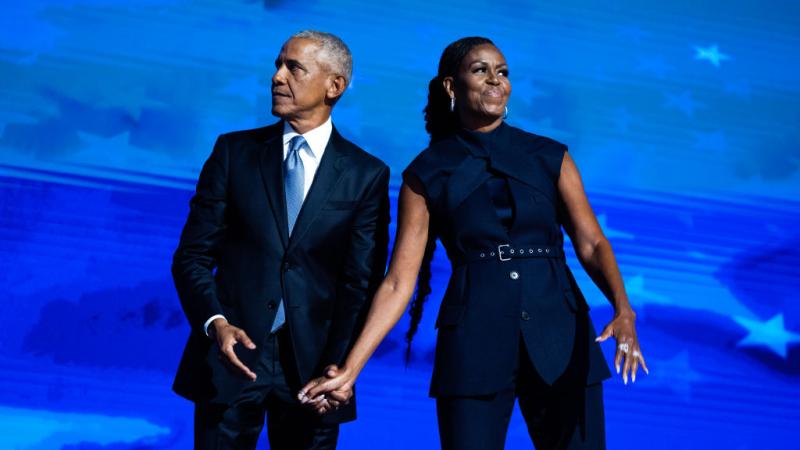Missteps, unsound instincts, woke agendas: Democrat candidate class stumbles down stretch
Across the country, Democrats running for office this election cycle have been underperforming, even after their Republican rivals were dismissed as beyond the pale.
As voters prepare to cast their ballots, a number of Democrat candidates running in high-stakes races across the country find themselves in a position many in their party didn't expect: facing a real threat of defeat at the hands of a so-called MAGA Republican they once deemed too right-wing or politically unseasoned to win.
The early conventional wisdom within the political and media elites held that the GOP had hurt itself this election cycle with a candidate class of unelectable extremists and Trump loyalists. But in the end, polling now suggests, it was the Democrats who saddled themselves with candidates who underperformed expectations, thanks to a combination of high-profile missteps, unsound political instincts, and woke policy agendas well to the left of mainstream.
Here are six examples of Democrats who have collapsed in the polls heading into Election Day:
John Fetterman
One of the Democrat candidates who's fallen furthest in the polls is Pennsylvania Senate nominee John Fetterman, who's now slightly behind his Republican opponent, Dr. Mehmet Oz, by less than one percentage point, according to the RealClearPolitics average of recent polling.
Fetterman had been leading comfortably by 9 points as recently as mid-August, but since then his lead has steadily eroded to a virtual tie amid a series of bad headlines.
Fetterman's "painful" performance at a debate with Oz late last month raised concerns among Democrats as he struggled to answer questions and appeared to be showing signs of a stroke he suffered earlier this year.
Beyond health concerns, Fetterman has flip-flopped on several progressive positions he once embraced, raising questions of trustworthiness as he seeks to make his candidacy palatable to more moderate general election voters.
In one recent case, Fetterman walked back his apparent call to release all second-degree murderers with life sentences from Pennsylvania's prisons. Fetterman has also switched his position on fracking, as he tries to keep his progressive base motivated without alienating voters in a state reliant on the oil and gas industry.
Oz, meanwhile, was endorsed by Donald Trump but has been consistently written off as likely to lose the Senate race.
Mandela Barnes
Another Democrat who's fallen in the polls after leading for months is Wisconsin Senate nominee Mandela Barnes, who's now trailing incumbent Republican Sen. Ron Johnson by 3 points, according to the RealClearPolitics average. In late August, Barnes was leading by 6 points.
Like Fetterman, Barnes has been hurt by a series of bad headlines, such as a recent story highlighting his long history with a liberal nonprofit group that aims to defund the police and make Wisconsin a sanctuary state for illegal immigrants.
Also like Fetterman, Barnes has come under fire for walking back a range of left-wing positions he'd previously endorsed.
One such abandoned position is defunding "over-bloated" police departments and allocating those funds for other purposes. He's also indicated support for eliminating cash bail for low-level crimes and cutting the prison population in half — stances he softened earlier this year.
Another such position is apparent support for the movement to abolish U.S. Immigration and Customs Enforcement (ICE). Barnes has also expressed support for illegal immigrants receiving driver's licenses and in-state college tuition.
This year, however, Barnes has made a concerted effort to distance himself from a far-left immigration agenda.
Beyond immigration, Barnes has described the founding of America as "awful" and argued one of the answers to the country's problems is to "stymie capitalism, the way it is in America."
Barnes dismissed the notion of trying to win over "middle of the road Republicans" and called for "making this the most progressive Democratic caucus in history."
Earlier this year, Trump-backed Johnson was widely projected to lose the race.
Kathy Hochul
New York Democrat Gov. Kathy Hochul is clinging to a small lead in the polls over her Republican challenger, Rep. Lee Zeldin, but the gap has narrowed significantly.
Until Oct. 13, Hochul was leading Zeldin by double digits, trouncing him by nearly 20 points for much of the summer, according to the RealClearPolitics average. Today, Hochul is leading by just 7 points, with the Trafalgar Group putting the race at a tie.
As a result, observers are saying Zeldin, another Trump-endorsed candidate once thought to have no chance of victory, could win in an unexpectedly competitive race in deep-blue New York.
Fueling much of this momentum for Zeldin appears to be crime, which ranks as the top issue for New York voters amid a surge in crime in New York City.
Hochul appeared to downplay the crime spike on Monday, accusing Zeldin of "hyperventilating" on crime and "trying to scare people" through "fearmongering." Her latest comments echo a frequent campaign talking point that Zeldin, who's made combating crime a key to his campaign, and others raising concerns about crime in New York are "master manipulators" and "data deniers" spreading a "conspiracy" about New York not being a safe state.
Hochul has frequently downplayed crime concerns on the campaign trail, including in the high-intensity glare of the debate stage.
Katie Hobbs
Arizona Democrat gubernatorial nominee Katie Hobbs has also seen a decline in the polls in recent months. In early September, Hobbs was narrowly leading Trump-backed Republican opponent Kari Lake but now trails by 2 points, according to the RealClearPolitics average.
Lake, who's been called "Donald Trump in high heels" and a "threat to our democratic republic," is now the favorite to win, in part due to multiple high-profile gaffes by Hobbs.
Hobbs has raised eyebrows for refusing to debate Lake despite repeated requests to do so, leading Republicans to criticize her for ducking her opponent and Democrats to chide her for being too timid.
Hobbs says she has no regrets about her decision. But last month when confronted by a Project Veritas journalist about the matter while eating at a fast-food restaurant, Hobbs spilled her drink and darted to the bathroom.
Immigration has also been a tough issue for Hobbs in Arizona, a border state. She noticeably flipped her position on Title 42, the public health authority exercised by the Trump administration that permits border officials to expel migrants without allowing them to apply for asylum in order to limit the spread of COVD-19.
In early April, Hobbs said Title 42 "isn't working." Just three weeks later, however, she urged Biden to reverse his "rash decision" to end the policy.
Immigration has been a top issue in Arizona this election cycle.
Gretchen Whitmer
Michigan Democrat Gov. Gretchn Whitmer currently leads Republican challenger Tudor Dixon by 4 points, according to the RealClearPolitics average. In late August, however, that lead stood at 18 points, and since then it's been progressively declining.
Trump-backed Dixon has closed the gap despite a huge cash advantage for her incumbent opponent, who was initially a heavy favorite in what's now anyone's race.
Whitmer has faced blowback in part for COVID-19 school closures she implemented. She claimed the closures lasted just three months in the pandemic's early phase while ignoring her health department's three-week high school closure that fall and her call to shut down schools for two weeks in April 2021.
The Washington Free Beacon reported that Whitmer refused Republican calls to require districts to offer in-person learning in grades K-5 in 2020-2021, allowing Detroit and Grand Rapids to keep schools closed most of the academic year, while Ann Arbor and Flint started the 2022 calendar year remotely.
More recently, Whitmer closed out her campaign by referring to women as "people with a period" in a brief address to TikTok on Monday.
Joe Biden
Overshadowing all Democrat candidates across the country is President Biden, whose consistently low approval ratings have proven to be a burden for many Democrats running for both state and federal office.
Biden's overall approval rating, which reached all-time lows earlier this year, stands at 42% approval and 55% disapproval, according to the RealClearPolitics average. More troubling is new polling out Monday indicating a last-second drop in popularity for Biden on the eve of the election — including an all-time low approval rating among independents according to one new survey from NBC News.
Perhaps more damaging, however, is how polling has shown for months that a majority of Americans disapprove of Biden's handling of the economy, including inflation, and crime, which consistently rank as the top two issues for voters.
Many Democrats running for office have turned to Barack Obama rather than Biden in a last-minute effort to generate enthusiasm among the party's base before Election Day.















